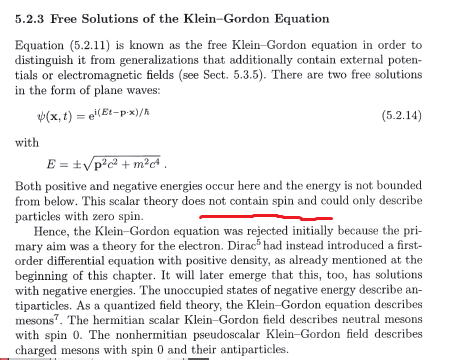I have a question about an argument used in Schwabl's "Advanced Quantum Mechanics" concerning the properties of the Klein-Gordan-Equation (see page 120):
Since the eigenenergies of free solutions are $E= \pm \sqrt{p^2c^2+m^2c^4}$the energy states aren't bounded from below. But I don't understand why that then K-G-equation provide a scalar theory that does not contain spin and then could only describe particles with zero spin.
Intuitively, I guess because that spin can't regard by a scalar equation but I find this "argument" too squishy and would like to know a more plausible argument.

